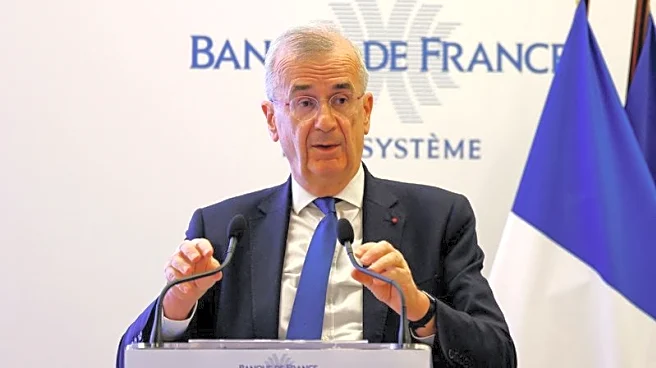What's Happening?
Bhutan has announced its decision to transition its national digital identity system from Polygon to Ethereum, marking a significant step in blockchain adoption at the national level. This move, set to be completed by the first quarter of 2026, positions
Bhutan as a pioneer in using public blockchain infrastructure for sovereign identity management. The decision was highlighted by the presence of Ethereum co-founder Vitalik Buterin and Ethereum Foundation Chairperson Aya Miyaguchi at the launch ceremony. Bhutan's National Digital Identity (NDI) system, initially launched in 2023, has evolved from Hyperledger to Polygon, and now to Ethereum, primarily for enhanced security. The system allows Bhutan's citizens to store digital credentials in secure digital wallets, providing them control over their personal information.
Why It's Important?
The transition to Ethereum for Bhutan's digital identity system underscores the country's commitment to leveraging decentralized infrastructure for critical national systems. This move enhances security by reducing the risk of identity theft and aligns with Bhutan's governance philosophy of prioritizing citizen empowerment and data sovereignty. By adopting Ethereum, Bhutan not only strengthens its digital identity security but also positions itself as a potential hub for blockchain innovation in South Asia. The decision reflects a broader trend of countries exploring blockchain for national identity systems, with Bhutan leading the way in using a public blockchain like Ethereum.
What's Next?
As Bhutan implements its blockchain-based identity system, it may serve as a model for other countries looking to enhance their digital identity infrastructure. The success of this initiative could encourage other nations to consider similar transitions, potentially leading to a broader adoption of blockchain technology in government systems. Bhutan's move may also stimulate further innovation in decentralized applications, as the country explores new possibilities in digital governance and finance.
Beyond the Headlines
Bhutan's adoption of Ethereum for its national identity system highlights a shift towards more decentralized and secure digital infrastructures. This move could influence global discussions on digital identity management, emphasizing the importance of individual sovereignty and privacy. As more countries observe Bhutan's progress, there may be increased interest in blockchain solutions that prioritize citizen control over personal data, potentially reshaping how governments interact with their citizens in the digital age.

















